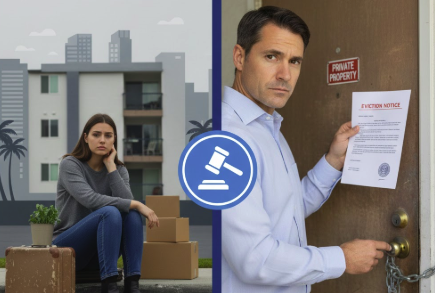The 2025 San Diego Landlord Checklist: Mastering Rent Control & Just Cause Eviction (AB 1482 & Beyond)
By Scott Engle, Broker/Owner, Realty Management Group
🔑 Key Takeaways
- Rent Cap: Most San Diego properties face rent increase restrictions which use 5% + CPI percentage or 10% annual total increase as the lower value under AB 1482. The maximum rent increase for San Diego County properties during Aug 2025-Jul 2026 reaches 8.8%.
- The landlord requires a valid "Just Cause" (At-Fault or No-Fault) to terminate tenancies after the first 12 months of residency.
- Landlords must follow strict No-Fault eviction procedures under SB 567 because they need to demonstrate property ownership and offer relocation assistance to prevent **triple damage penalties**.
- The new law AB 2347 extends the period tenants receive to answer unlawful detainer lawsuits from 5 to 10 court days thus prolonging the entire eviction process.
- The new regulations require landlords to keep exact records while following all state and local laws to avoid expensive legal fees and triple damage penalties.
Table of Contents
- I. Introduction: Why Compliance is Your #1 Priority
- II. Section 1: Rent Control Limits (How Much Can I Raise Rent?)
- III. Section 2: Just Cause Eviction (When Can I End a Tenancy?)
- IV. Section 3: New Landlord-Tenant Laws for 2025
- V. Conclusion & Call to Action
- ❓ Frequently Asked Questions (FAQ)
I. Introduction: Why Compliance is Your #1 Priority
Owning rental property in San Diego County brings investors both financial gains and essential legal responsibilities. The Tenant Protection Act (AB 1482) of California provides the legal structure which enables the implementation of new rules. The San Diego rental market has become more complicated because landlords now face higher penalties from state and local regulations which include SB 567 and AB 2347.
A single incorrect action during the notice period or rent increase process or documentation step will result in three major consequences for landlords:
- The City and County has established a system to enforce regulations through major financial penalties against landlords who do not follow the rules.
- A landlord's mistake will instantly result in the loss of a valid eviction case.
- The legal process of handling tenant disputes extends into a long and costly experience.
The guide provides essential information which enables San Diego property owners to defend their financial resources while achieving maximum investment performance through legal expertise.
II. Section 1: Rent Control Limits (How Much Can I Raise Rent?)
The primary worry for property owners centers on their freedom to boost rental prices. The rent increase limit for most San Diego County residential rental properties depends on their specific exemptions but most properties face a maximum cap.
A. The Statewide Rule (AB 1482)
The AB 1482 law sets a maximum rent increase at 5% above CPI plus the percentage change in the cost of living (CPI), which is capped at a total of 10% annual increase. The official March 2025 CPI shows that San Diego County properties can receive their highest possible rent increase of 8.8% between August 1, 2025 and July 31, 2026. The rent increase limit for properties under AB 1482 protection reaches its highest point at 8.8% for this time period.
B. Critical San Diego Local Details
The City of San Diego together with other local jurisdictions have created their own ordinances which offer tenants better protection than what state laws provide. You need to check your property compliance with the most strict law that applies to it through consultation with local experts.
C. Key Property Exemptions
The AB 1482 rent control regulations exclude particular types of rental properties from their application. Every landlord needs to verify their property status first. The following properties qualify for exemption from AB 1482 rent control:
- New Construction properties that received their certificate of occupancy within the previous 15 years maintain their exemption status.
- True Owner-Occupied Single-Family Home (or Duplex): The owner must prove they reside in the property as their primary residence and the property must be their personal ownership.
- The property qualifies for single-family exemption status when owners provide written notification to tenants about the exemption status.
State laws require you to give tenants the required disclosure statement when your property qualifies for state exemption rules.

III. Section 2: Just Cause Eviction (When Can I End a Tenancy?)
A landlord needs to have a valid "Just Cause" reason to end a tenancy agreement when the tenant has lived in the unit for at least 12 months. The rules for No-Fault evictions have become more stringent under SB 567 which introduced new requirements for 2025.
A. At-Fault Causes (The Tenant's Mistake)
The following eviction reasons result from tenant actions so relocation assistance is not needed:
- Failure to Pay Rent: The tenant needs to fix their rent payment issue before the landlord can begin eviction procedures.
- Material Breach of Lease: The tenant needs to show proof through documentation that they broke a fundamental condition in their rental contract.
- Illegal Activity: The property must not be used for any illegal activities.
- Nuisance or Waste: The tenant needs to perform substantial property destruction or generate ongoing disturbances which impact residents in adjacent properties.
B. No-Fault Causes (The Landlord's Intent – Highly Regulated)
The tenant did not cause any issues so landlords must provide relocation assistance which amounts to two months' rent in San Diego but reaches higher amounts for senior and disabled tenants.
| Cause | Stricter 2025 Requirements (SB 567) | Compliance Risk |
|---|---|---|
| Owner/Family Move-In | The owner or their qualified relative needs to establish residence in the property within 90 days after the tenant departs and stay in the property as their primary home for at least 12 months. The notice requires you to establish which person will obtain control of the property. | The highest risk of facing treble damage penalties occurs when landlords falsify their move-in activities. |
| Substantial Remodel | Must be extensive work (replacing structural, electrical or plumbing systems) that requires a government permit. The eviction notice requires proof of permits or a signed agreement for hazardous material removal. | The landlord needs to return the unit to its original rent level and pay moving expenses to tenants when their renovation work fails to start or finish. |
IV. Section 3: New Landlord-Tenant Laws for 2025
The new laws of 2025 force San Diego property managers and landlords to change their business practices. The new laws of 2025 require landlords to follow two main regulations.
- The law AB 2347 gives tenants an additional five days to respond to eviction lawsuits which results in a longer eviction process. The new response period is now 10 court days.
- The City of San Diego requires landlords to disclose utility pass-through costs to tenants through specific lease language which becomes mandatory starting from August 2025.
- The new law requires landlords to provide tenants with rent reporting options through at least one nationwide consumer reporting agency starting from April 1, 2025 while charging up to $10 monthly for reporting costs.
V. Conclusion & Call to Action
The San Diego rental market demands landlords to develop skills which extend past their fundamental duties of rent collection and property upkeep. The property owner needs to stay updated about new laws while performing all compliance and eviction procedures perfectly.
Your investment protection from legal risks depends on the fees you pay to hire a professional property manager because they prevent non-compliant eviction notices and unauthorized fees and late filing deadlines. Your asset protection depends on your ability to reduce your overall liability exposure. The new 2025 laws introduce severe penalties which include steep fines and legal treble damages. Our local San Diego experts who monitor daily changes in the law will help you avoid all new 2025 regulations.
Click here to request a FREE confidential Rental AnalysisContact Realty Management Group
Need help navigating the complex 2025 landlord laws in San Diego County? Our local compliance team is here to protect your investment.
📞 (619) 456-0000
✉️ info@choosermg.com
🌐 www.ChooseRMG.com
Related Articles
❓ Frequently Asked Questions (FAQ)
Q: What are the present rent increase restrictions which apply to San Diego County properties that must obey AB 1482 regulations?
A: The rent increase limit for properties under AB 1482 in San Diego County between August 1, 2025 and July 31, 2026 reaches 8.8%*through the combination of 5% with the 3.8% San Diego-Carlsbad CPI increase.
Q: The "Owner Move-In" rule requires owners to live in the property for a particular duration.
A: Yes. The owner must move into the property within 90 days after the tenant leaves and stay in the unit as their main home for 12 months to avoid severe penalties. The owner must provide relocation assistance to tenants at the time of notice service according to the new rules from SB 567.
Q: What specific relocation assistance do I need to give to No-Fault eviction cases that take place in San Diego?
A: The City of San Diego requires landlords to give two months' rent relocation assistance for no-fault evictions but senior or disabled tenants receive three months' rent assistance. The payment of relocation assistance must happen within 15 days after the notice to tenants service.
Q: The new law AB 2347 extends the time period for tenants to answer eviction lawsuits to what duration?
A: The new law AB 2347 extends the time period for tenants to answer eviction lawsuits to 10 court days starting from January 1, 2025 which doubles the previous 5-day deadline.


